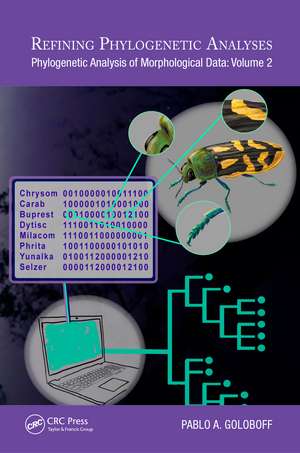Refining Phylogenetic Analyses: Phylogenetic Analysis of Morphological Data: Volume 2: Species and Systematics
Autor Pablo A. Goloboffen Limba Engleză Paperback – 26 aug 2024
Key Features
- Discusses the treatment of ambiguity in phylogenetic analyses in depth, for summarizing results or comparing trees
- Reviews literature on arguments and methods for weighting morphological characters and their practical application
- Describes theory and application of methods for evaluating strength of group support, based on either resampling or comparisons with suboptimal trees
- Discusses the use of morphometric characters in phylogenetic analysis
- Presents extensive information on commands and options of the TNT computer program, including the use and creation of scripts
| Toate formatele și edițiile | Preț | Express |
|---|---|---|
| Paperback (1) | 441.36 lei 43-57 zile | |
| CRC Press – 26 aug 2024 | 441.36 lei 43-57 zile | |
| Hardback (1) | 787.65 lei 43-57 zile | |
| CRC Press – 22 iul 2022 | 787.65 lei 43-57 zile |
Preț: 441.36 lei
Nou
Puncte Express: 662
Preț estimativ în valută:
84.45€ • 88.41$ • 69.88£
84.45€ • 88.41$ • 69.88£
Carte tipărită la comandă
Livrare economică 07-21 aprilie
Preluare comenzi: 021 569.72.76
Specificații
ISBN-13: 9781032274676
ISBN-10: 1032274670
Pagini: 312
Ilustrații: 72
Dimensiuni: 156 x 234 mm
Greutate: 0.58 kg
Ediția:1
Editura: CRC Press
Colecția CRC Press
Seria Species and Systematics
Locul publicării:Boca Raton, United States
ISBN-10: 1032274670
Pagini: 312
Ilustrații: 72
Dimensiuni: 156 x 234 mm
Greutate: 0.58 kg
Ediția:1
Editura: CRC Press
Colecția CRC Press
Seria Species and Systematics
Locul publicării:Boca Raton, United States
Public țintă
Academic, Postgraduate, Professional, and Professional ReferenceCuprins
6. Summarizing and Comparing Phylogenetic Trees. 7. Character weighting. 8. Measuring degree of group support. 9. Morphometric characters. 10. Scripting: the next level of TNT mastery.
Notă biografică
Born in Buenos Aires, Pablo A. Goloboff became interested in spider biology and systematics in the late 70s, in the Museo Argentino de Ciencias Naturales. His first papers (published during the 80s) were on spider systematics, but he soon became more interested in systematic theory and phylogenetic methods. He graduated with a Licenciatura in Biology in 1989, from Universidad de Buenos Aires, and then pursued doctoral studies in Cornell University and the American Museum of Natural History, in New York, between 1989 and 1994. He published his first methodological papers in the early 90s, gradually switching his research from spider systematics to systematic theory. During his stay at Cornell University, he became more involved with quantitative methods for parsimony analysis, and wrote his first computer programs. He moved to Tucumán in 1994, to work for the CONICET, and continued working on theory and methods for systematics and historical biogeography. He has published over a hundred scientific papers and about a dozen computer programs, the best known of which are Nona, Piwe, TNT (for phylogenetics), and VNDM (for biogeography). He is a Fellow Honoris Causa of the Willi Hennig Society, and served as President of the society from 2004 to 2006. Since 1995, he has been regularly teaching courses on phylogenetics in Argentina and about a dozen countries.
Recenzii
“There is no question that Goloboff provides a rigorous, logical and analytically sound framework for analyzing data – probably the most carefully considered rationale that has ever been published for phylogenetics of any kind of data … “
- Andrew Brower, Assistant Director at USDA Animal and Plant Health Inspection Service (APHIS)
“… this book is focused on phylogenetic analyses based on morphological date [and] paleontologists will find its content particularly useful. … provide[s] both researchers and students alike with the theoretical bases and tools for the correct building of robust phylogenetic data matrices, their analysis, and subsequent interpretation. [this book] will become a ‘must-read’ …”
- M. D.Ezcurra in Ameghiniana, 2024, vol 61 (1).
- Andrew Brower, Assistant Director at USDA Animal and Plant Health Inspection Service (APHIS)
“… this book is focused on phylogenetic analyses based on morphological date [and] paleontologists will find its content particularly useful. … provide[s] both researchers and students alike with the theoretical bases and tools for the correct building of robust phylogenetic data matrices, their analysis, and subsequent interpretation. [this book] will become a ‘must-read’ …”
- M. D.Ezcurra in Ameghiniana, 2024, vol 61 (1).
Descriere
This volume discusses the aspects of a phylogenetic analysis that go beyond basic calculation of most parsimonious trees. Practical application of all principles discussed is illustrated by reference to TNT, a freely available software package that can perform all the steps needed in a phylogenetic analysis.













